The Olympic Games originally took place at Olympia, Greece, as part of a religious festival to honor Zeus. The first record of the Olympic Games dates back to 776 B.C.E., around 3,000 years ago. These Games were staged from 776 through 393 C.E. They were brought to a halt by Emperor Theodosius I when he banned all "pagan festivals. It was a part of his attempt to make Christianity the predominant religion of the Roman Empire.
Related: Worst Roman Emperors, from Incompetent to Insane
The first modern Olympics were held in Athens in 1896. This revival led to the current Olympiad that we’re familiar with now. Many of the things that we consider to be staples of the Olympic Games today were not part of the original Greek tradition. The eternal flame, for example, was not a part of the Games until the Amsterdam Summer Olympics in 1928. If you’re interested in learning more about the history of the Olympic Games, we’ve selected fourteen books to give you varying perspectives on the progression of the Olympics—both the tradition in Olympia, and the Games as we know them today.
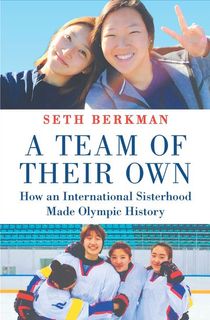
A Team of Their Own
Two weeks before the 2018 Winter Olympics, South Korea’s women’s ice hockey team was faced with the uncertainty of whether or not they would compete amidst international tensions. Against all odds, and with a team composed of athletes from across the world, the young women made history and were able to bring North and South Korea closer. This inspirational story of sisterhood and identity resonates beyond the world of athletics.
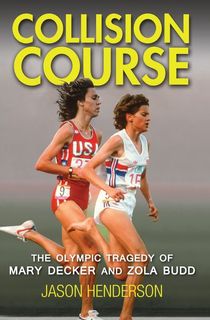
Collision Course
The 1984 Olympic Games in Los Angeles, California were home to controversy when Mary Decker, who was favored to win the 3000 meter race, collided with Zola Budd, leaving her injured on the sidelines while Maricia Puica of Romania won the gold.
Author Jason Henderson tells the story of Mary Decker, former world champion, and her collision with 18-year-old Zola Budd that ruined both their chances at winning gold. Henderson analyzes the personal and professional histories of both athletes and examines the sporting and political intrigue surrounding them and their fateful race.
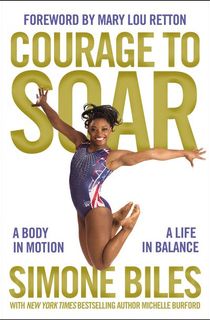
Courage to Soar
In the Olympic champion’s official autobiography, Simone Biles shares the story of her path to greatness, and how her influence in the world of gymnastics has shaped her life and career. Anyone who has ever witnessed Biles break records knows why she is considered the greatest gymnast of all time.
Learn how Biles rose from an early childhood in foster care and how a school field trip introduced her to gymnastics, starting her on the path to becoming the most decorated gymnast in history. Biles’s story is a true inspiration not only to young women and girls, but to anyone struggling against adversity.
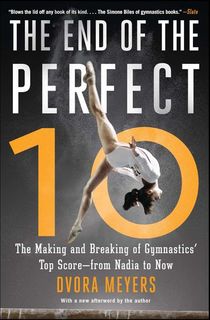
The End of the Perfect 10
In London in 2012, U.S. Olympic gymnast McKayla Maroney performed what was thought to be the greatest vault of all time, but to the bafflement of everyone watching, she received a score three-tenths of a point away from perfection. Ever since the 2004 Olympics, gymnastics has been scored on an open-ended system, as opposed to out of 10. But, as many have asked in the decades since anyone has received a perfect score, how can perfection be judged on this new scale?
Dvora Meyers examines the history of U.S. gymnastics and the evolution of the sport since the fundamental changes that took place in 2004, with an insider’s perspective on elite gymnastics.
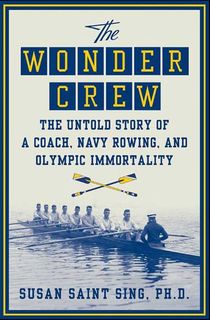
The Wonder Crew
The Wonder Crew is the story of the U.S. Naval Academy crew team’s journey through defeating the Ivy Leagues and winning their way to the Olympics. In 1920, the U.S. team won gold and, under the guidance of Annapolis coach Richard Glendon’s Americanized style of rowing, the U.S. held the longest winning streak in any single sport in Olympic history, with 40 years of gold. What was once a sport reserved for a privileged few had been adapted and dominated by a group of young Navy midshipmen, and their legacy shaped Olympic history.
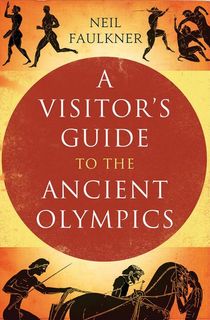
A Visitor's Guide to the Ancient Olympics
This book is for the modern Olympic viewer that is interested in a tour of the ancient Olympic Games, but sadly finds themselves lacking access to a time machine. Faulkner will take you through the ins-and-outs of the ceremonies and games that took place in Greece during August 338 B.C.E. Spectators (all men—women were not allowed to attend) watched athletes compete in footraces, horse and chariot races, and a pentathlon, among other sports.
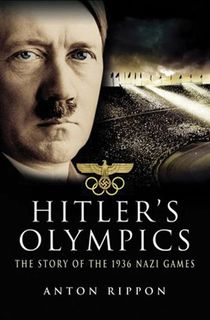
Hitler's Olympics
Rippon’s book is an insightful look into the one of the first overtly political Olympic Games. By shielding their plans for radical expansion, as well as their anti-Semitism, Hitler manipulated propaganda during the Games to project the image of a peaceful and glittering Germany. This book also examines how the rise of Nazism affected German athleticism in the early 30s. Rippon’s account reveals that despite the fact that much of the world was aware that Nazi Germany had become a police state, the Berlin Olympics were allowed to go on.
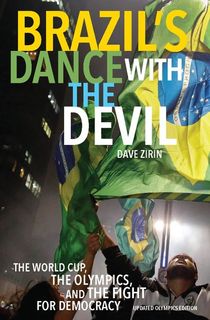
Brazil's Dance with the Devil
Just before the 2016 Summer Olympics, Brazilians staged one of the country’s biggest protest marches in decades. To find out the source of the protest after the country had been so jubilant to host both the 2014 World Cup and the 2016 Olympics, sports journalist Dave Zirin traveled to Brazil. He gained first-hand insight on the toll these staging efforts were taking on the average Brazilian citizen. By bringing their protest to the streets, Brazilians brought a conversation about the costs—financial and human—of the Olympics to the world stage.
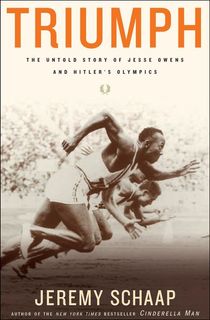
Triumph
In 1936, Jesse Owens won gold medals for four events at the Berlin Olympics: 100 meters, long jump, 200 meters, and 4x100-meter relay. This African-American excellence upset Hitler’s prevailing discourse of Aryan supremacy—right in the midst of the rise of Nazism. Drawing from personal accounts from the Owens family, as well as previously unpublished interviews, Schaap’s book describes the courage of Owens and his teammates during what many of the athletes that competed dubbed the “Nazi Olympics”.
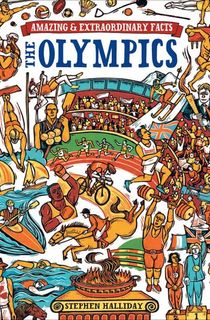
The Olympics
This guide reveals some of the most fascinating facts and tales behind one of the most well-known sporting events in history. Looking back into the games’ origins in Ancient Greece and following the developments that were subsequently made in the 17th century, Halliday traces the developments that influenced the Olympics as we know them now. Have you ever wondered who was considered the first cheat in the Olympics? Do you know which Shakespearian play makes reference to the Games? Do you know when the event of “shin-kicking” was banned? Did you even know that there was once a “shin-kicking” event?

Fire on the Track: Betty Robinson and the Triumph of the Early Olympic Women
Betty Robinson won the gold medal for the 100-meter at the 1928 Olympics in Amsterdam, setting a world-record setting time of 12.2 seconds at only 16 years old. It was the first Olympiad that allowed women to compete in track and field. She would go on to win another gold in 1936. But a near-fatal crash in 1931 would put Robinson out of the competitive arena for some time. In her absence, other women in Track and Field emerged at the Los Angeles Games, building on the foundation that Betty had laid for women in the sport. Fire on the Track explores her and their contributions to the Olympic Games.

Power Games: A Political History of the Olympics
A former U.S. Olympic soccer team member, Jules Boykoff draws on the history of Games, looking at the varied political movements that have influenced the Olympics throughout the 19th century. These political impacts vary from the Workers’ Games and Women’s Games in the 20s and 30s, to the contemporary trend of corporate influences.

Rome 1960
Summer of 1960 saw many firsts for the Olympics: the first doping scandal, the first athlete commercially sponsored for wearing a shoe brand, and the first commercially televised Summer Games. With the event taking place at the height of the Cold War, every action was weighed for its potential propaganda value. Pressure to provide equal rights to people of color and women were beginning to reemerge from the post-War and post-Communist fears. Sub-Saharan Africa had 14 nations in the process of claiming independence. Maraniss looks at the varying angles that made the Rome Summer Olympics particularly unique.

The Games
Beginning with the reinvention of the Games in Athens in 1896 and tracking their evolution to Rio’s 2016 Games, Goldblatt explains how the Olympics became the global spectacle that we know them to be now. This book also profiles well-known personalities around the Games, such as Jesse Owens, Usain Bolt, and Nadia Comaneci, among others.




